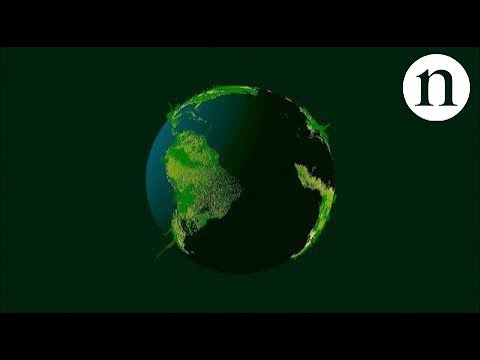Huge grant for ecosystems researcher
The ecologist Tom Crowther only recently joined ETH Zurich as assistant professor. Virtually his first achievement was to win a grant offering potential research funding of more than 17 million euros over the next 13 years. So, who is this rising star?
Tom Crowther stands at a desk in a small office in the university’s CHN building and looks at a computer screen. “Actually, this is not my office,” he says, almost apologising for the fact that his is unable to offer his guest a more convivial welcome.
Just recently the 31-year old won a grant worth over 2.7 million Swiss francs from the Dutch foundation DOB Ecology, which funds long-term research projects into climate change and forest restoration. And this only covers the first phase, scheduled to run for three years. If Crowther and his team complete this project phase successfully, the foundation, set up by a Dutch family of entrepreneurs, will make another 15 million Swiss francs available over the next 10 years.
From postdoc to head of research
“A huge amount of money,” says Crowther, who admits that the idea of having so much money to play with filled him with mixed feelings. Initially he was delighted to win the grant, but then the nerves set in – especially worries about not being able to live up to expectations. “At that stage I was still a postdoc, and then I was appointed assistant professor at ETH. Having barely found my feet, I’m having to consider how to plan things as far ahead as 2030. It’s all slightly crazy,” he says, with a wry grin.
In fact, he wasn’t the one who originally applied for the grant from DOB: his ground-breaking study on the total number of trees on the planet had attracted the attention of the Dutch foundation, which then encouraged Crowther to apply for a grant. He initially proposed funds for a project costing just over a million, but the foundation turned down his application on the basis that it only supports the most ambitious, long-term projects that generally cost more than this. So Crowther applied for annual funding of 1.5 million. “For the foundation, it was important to support a project with a long-term research vision that has the potential to inform, or even transform, the way we manage natural ecosystems in the fight against biodiversity loss and climate change.”
A better understanding of the carbon cycle
Now Crowther’s research mission is to develop a global understanding of the ecological processes that drive the carbon cycle and the climate. A deeper understanding is important for improving climate change forecasting. “If we understand how ecological processes are linked to the climate, we can also discover how to combat climate change through specific types of land use, for instance.”
One example of this is planting trees, according to Crowther. In certain climate zones, forest plantations sequester huge amounts of carbon. In other areas, such as snowbound open tundra or taiga forests, trees cover the snowpack, so less heat and light is reflected back off the surface of the planet. This ‘albedo effect’ can cause additional warming.
The generous grant will allow the climate scientist to quickly build up a large workgroup. He plans to recruit around 20 people from multiple disciplines. To fulfil his mission, he needs specialists from the fields of satellite remote sensing, the genetics of soil-dwelling organisms, the ecology of biotic communities and experts in modelling Earth systems. “Everyone is asking the ultimate question: what form will climate change take over the rest of this century, and how can we manage or conserve natural ecosystems to minimize these effects?” Crowther says.
On court with Andy Murray
Despite always being fascinated by nature, science was not always his calling. Crowther grew up in a non-academic environment in Wales, and didn’t think that he would have the change to follow his passion for environmental research. During his youth, he spent more time playing sport and socialising. He was highly competitive at tennis – he even played against some of the top players in the world including the likes of Andy Murray – and football, and he enjoyed socializing with friends in the local pubs. “I could just as well have settled into this type of lifestyle”.
At Cardiff University, he started to study soil ecology, but found it “hard going” because of his dyslexia that made it challenging to concentrate through long lectures and reading assignments. Just as his career was hanging in the balance, his eyes were opened by his tutor at the time, Professor Hefin Jones. As an undergraduate, Crowther had to give a talk to fellow students. This was so bad that Professor Jones showed him the door.
Even so, the professor had real faith in Crowther’s abilities. “Later on, over a beer in the pub, he managed to convince me that I have the potential to do well if I just focussed my attention a little.” It then became clear that he wanted to pursue a career in ecology and fully commit to it. “I have Professor Jones to thank for getting to where I am today”.
How many trees on the planet?
After completing his doctorate in ecology at Cardiff University, he switched to Yale University, where he studied the ecology of ecosystems, with a specific focus on soil. Whilst in the USA, he came into contact with an organisation that is leading the United Nations “billion trees campaign”. But no one had a clue how many trees there actually were on the planet, so they couldn’t quantify the contribution of their efforts. Crowther was given the task of producing a global map of the world’s trees, which allowed them to discover the current population number.

The study appeared in 2015 in the journal Nature. Crowther and over 30 co-authors showed that around 3 trillion trees grow on Earth, eight times more than previous estimates. “Although that sounds a lot, 10 billion trees are lost every year, and humans have probably reduced the planet’s original tree population by around a half,” Crowther stresses. Those in charge of the campaign responded to the study by raising the target to one trillion trees.
Attracting attention pays off
The study also helped to raise the scientist’s public profile – even Bernie Sanders and Donald Trump sent tweets relating to this topic. It was the tree count, and the following media communications that drew DOB’s attention to Crowther. “Communication was the trigger for everything,” he says. Even now, scientists are seldom encouraged to present their research in the public domain. “If I hadn’t spent a lot of time doing so, no one would have known about my work.”
The grant will allow the Crowther lab to continue building an understanding of the global forest system that is necessary to guide restoration and conservation efforts. Given the importance of media and social communications in getting this grant, it now remains a priority. One of the conditions imposed by DOB is that the researcher sets up a separate digital marketing team to communicate the results and the science directly to the public so that it can have the widest possible societal impact. The young assistant professor is convinced: “Communication can have a far-reaching effect and help to advance science.”
Tom Crowther gave his inaugural lecture at ETH Zurich on 19 February 2018. The recording "Understanding global-scale ecology in order to combat climate change" can be found here.
